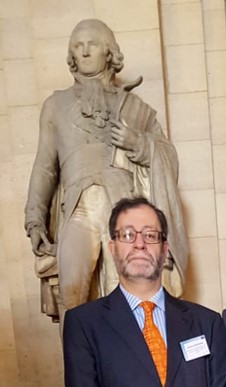 Francisco López Muñoz, professor of Pharmacology and director of the International Doctoral School of the Camilo José Cela University and full academician of the Royal European Academy of Doctors-Barcelona 1914 (RAED), participated last March 11 in the final conference of the European Project to Prevent Racism and Intolerance, held in Paris under the organization of the French Interministerial Delegation to Combat Racism, Anti-Semitism and Homophobia. The academician was invited by the French Ministry of Justice as a representative of Spanish civil society in recognition of his long career in the defence of Human Rights and fight against anti-Semitism.
Francisco López Muñoz, professor of Pharmacology and director of the International Doctoral School of the Camilo José Cela University and full academician of the Royal European Academy of Doctors-Barcelona 1914 (RAED), participated last March 11 in the final conference of the European Project to Prevent Racism and Intolerance, held in Paris under the organization of the French Interministerial Delegation to Combat Racism, Anti-Semitism and Homophobia. The academician was invited by the French Ministry of Justice as a representative of Spanish civil society in recognition of his long career in the defence of Human Rights and fight against anti-Semitism.

Dr. Francisco López
The European Project to Prevent Racism and Intolerance has as its main objective to improve the penal sanctioning regime in relation to hate crimes, including racism and discrimination based on religion or nationality, in view of the proliferation in Europe of this type of behaviours. The project has sought to improve exchanges between judicial actors from four countries of the European Union (France, the United Kingdom, Germany and Spain), as well as to carry out an analysis of existing measures and provisions in each country, including alternative measures for procedures criminals, identify innovative measures for these problems and disseminate best practices to interested parties in other countries.
With European funds, the project began in November 2017 and after different work meetings during the last year and a half, including visits from field to the four countries involved, a Guide of Good Practices has been prepared for the fight against racism and xenophobia that will be presented to all the countries of the European Union, as well as to the heads of the Council of Europe, of the European Commission and the European Agency of Fundamental Rights.
The final conference of the project was analysed in depth the legal response to racism and intolerance, the discourse of hatred in the networks and the sensitization in the matter of cooperation on the part of diverse organizations of the civil society. This meeting was attended by representatives of the 28 member countries of the European Union, mainly legal and judicial experts, including magistrates and prosecutors, as well as other experts in related matters and representatives of civil society organizations.




